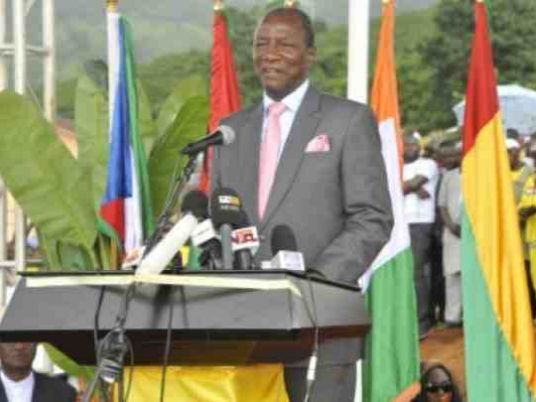CONAKRY, Guinea – Guinean President Alpha Conde escaped a sustained rocket and gunfire attack by unknown assailants on his residence on Tuesday that killed one person and left his home riddled with bullet holes.
It was not clear who was behind the attack on Conde, who came to power last December in an election aimed at drawing a line under decades of coups in the West African nation where iron and bauxite resources have attracted world mining majors.
A presidential source said the attack was clearly a failed assassination attempt targeting the president, who rushed to the headquarters of the state broadcaster to appeal for calm.
"Our enemies will not be able to stop Guinea's progress," Conde said in a statement witnessed by a Reuters reporter as it was recorded.
"I appeal to you to stay calm…Let the army and the security services do their work," said the 73-year-old Conde, who was dressed in a traditional African robe and gave no sign of having been harmed.
The message was due to be aired later on state radio and television.
Eyewitnesses said the attack took place at Conde's personal residence in the Kipe suburb of the capital Conakry in the small hours of Tuesday and lasted for nearly two hours before it was repelled by Conde's personal guard.
"The kitchen is covered in blood and part of the building is riddled with bullet holes," said one witness who declined to be identified, saying the main gate had been blown out with a rocket-launcher.
The presidential source said one suspect had been arrested following the attack but declined to give further details. There was no information on the identity of the person killed in the attack.
As day broke, soldiers erected roadblocks throughout the city and carried out checks on all vehicles on the road. Army pick-up trucks carrying soldiers patrolled the streets, but only a few residents ventured out of their homes.
Veteran opposition leader Conde came to power in the world's largest exporter of the aluminum ore bauxite last December after the first free election in the West African country since independence from France half a century ago.
The country had been ruled by a military junta since the death of longtime leader Lansana Conte in 2008.
IMPROVING ARMY DISCIPLINE
Guinea has a long history of authoritarian rule and its security forces have a reputation for brutality against dissidents as well as indiscipline.
However observers say there has been a marked improvement in army discipline since Conde came to power. He has put in place a new army leadership and appointed himself defense minister to try to drive security reform.
Former junta leader Moussa Dadis Camara, whose security forces killed more than 150 opposition demonstrators in a September 2009 attack, is in exile in Burkina Faso after being wounded in an assassination attempt.
A close former aide to Camara, Colonel Moussa Keita, was arrested on 1 July after he accused Sekouba Konate, the army official who engineered the transition back to civilian power, of having defrauded US$22 million from the state.
The 2009 election was marked by ethnic tensions between rival groups linked to Conde and his main challenger Cellou Dalein Diallo, whose Peul ethnic group accounts for around 40 percent of the population.
While Diallo conceded defeat, political tensions have simmered, with Diallo's UFDG opposing Conde's plans to carry out an electoral census and revamp the voter roll before a parliamentary election Conde wants to hold by year-end.
The UFDG wants the census to be carried out by an independent electoral body rather than the government.



